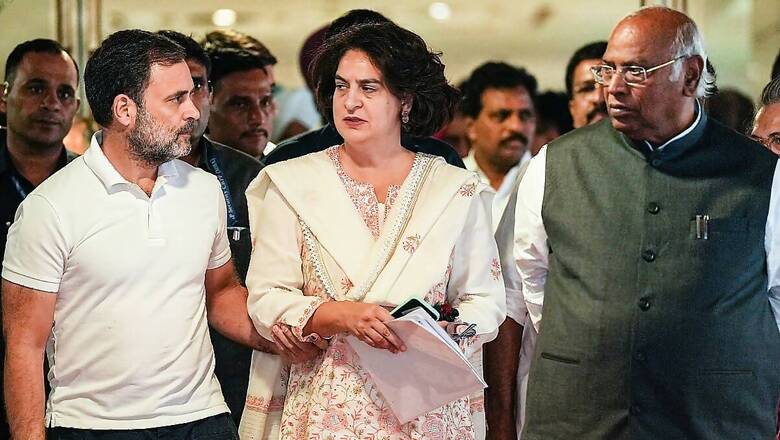
views
Former Prime Minister Indira Gandhi often invoked ‘the foreign hand’, implying external interference, a tactic designed to stir up nationalist sentiment. But in those days, she probably wasn’t aware of the fifth column that operated within her own corridors of power, with high officials and politicians on the payroll of the KGB, CIA, and other covert services.
Today, we know that her government, which spanned nearly two decades, was deeply infiltrated by informers, foreign spies, and moles. This leads one to wonder why. Was it because she apparently ran a strong government with a leaning towards the Soviets?
What is the scenario in 2024?
We have a cheerleading foreign agency in the form of the Congress party now. But it is bumbling and gauche. Earnest as it tries to be, the pathetic thing about its open vitriol and lies is that it routinely falls flat on its face. The desperation is writ large. Nothing the party does seems to resonate with the Indian public beyond its band of the already converted. Even the minorities, their traditional vote banks, have spread out to back other factions within the INDI alliance.
This sends ominous signals about the party’s prospects in the forthcoming Jharkhand and Maharashtra elections. Congress’s improved performance in the 2024 general elections in June also appears to have come at the expense of its allies—a fact the party is now openly grumbling about. Some claim the Congress is simply arrogant and predatory and is out to decimate the regional parties.
The Haryana electorate, on its part, has soundly rejected it, leading the Congress to snatch defeat from the jaws of what exit polls widely predicted to be a victory. In Jammu & Kashmir too, it performed poorly, leaving the winning National Conference (NC), its pre-poll ally, disappointed. Likely NC Chief Minister Omar Abdullah remarked that they were quite capable of forming the government with the help of a few independents, and that Congress, with its six or seven seats, was more or less superfluous. It was a warning that the Congress should not expect to determine any of the policy decisions.
After the BJP secured a majority on its own, with 48 of 90 seats in Haryana, Prime Minister Modi delivered his customary congratulatory speech to the victorious organisers, managers, and workers at the BJP headquarters in New Delhi. The assistance received from the RSS was also acknowledged and praised in various quarters. This victory granted the BJP an unprecedented third consecutive term in Haryana.
PM Modi, midway through his speech, also used the opportunity to thoroughly criticise and lambast the defeated Congress party and its leadership. Amongst a slew of substantial accusations, he outlined how the Congress and its leadership are aiding and abetting a foreign conspiracy to malign and target the present Government of India.
It is widely known that Rahul Gandhi, the Congress leader and current Leader of the Opposition in the Lok Sabha, has been engaging with members of the George Soros organisation and its affiliates during his frequent trips abroad, raising suspicions of possible funding ties. George Soros has openly declared his intent to bring down the Modi government and other so-called ‘authoritarian’ regimes. Soros, a billionaire short-seller who famously shorted the Bank of England, is an elderly Hungarian Jew with a reputation for harbouring a great deal of malice. Some suggest he is a willing tool of the American deep state, including the CIA. Rahul Gandhi seems to have no qualms about collaborating with Soros.
Additionally, the entire Gandhi family has reportedly signed a secret memorandum of understanding and cooperation with the Chinese at their embassy in New Delhi. The Chinese have reciprocated by investing in the Rajiv Gandhi Foundation, where Sonia Gandhi serves as its Chairperson. This raises the question: Does China also fund the Congress party?
During his recent visit to the United States, Rahul Gandhi falsely claimed that Sikhs in India could not wear their turbans or practise their religion in peace. His misleading statements, which were condemned by many prominent Sikhs in India, found endorsement from Khalistani terrorist elements abroad. These include Gurpatwant Singh Pannun, a US citizen, who regularly threatens violence against Indians, seemingly with immunity and protection from the Americans. In contrast, India has been accused of attempting to assassinate Pannun on American soil. Yet again, such elements appear to be among Rahul Gandhi’s associates.
The Congress party routinely incites India’s minority populations, including the sizeable Muslim and Christian communities, as well as evangelists working with them in states such as Tamil Nadu, Punjab, the Northeast, and Andhra Pradesh, against Hindu gurus, the RSS and its affiliates, the BJP, and the Modi government. Rahul Gandhi himself frequently launches ineffective attacks on Prime Minister Modi, filled with lies and slander. Given his family’s infamous history of corruption and their involvement in the 1984 Sikh pogrom, his credibility is hard to sustain.
When abroad, Rahul Gandhi is often seen conferring with Pakistani activists opposed to India’s hold over J&K, Islamists, individuals with links to the ISI, and far-left politicians in Britain. He embodies the adage that ‘the enemy of my enemy is my friend’. And yet, despite his claims of India being under an authoritarian regime, he faces no arrest for sedition upon his return, despite his repeated propagandist ventures overseas.
This negative mindset is widely believed to be driven by the Gandhi family’s bitterness over being kept out of power at the Centre by the electorate for over a decade now. It reflects the considerable toxicity abroad, simmering with anger over perceived wrongdoings. The Congress’s frustration is also evident in Parliament and on the streets of India. They seem to be asking in despair: why is there no popular revolt among the farmers, the poor, or the Muslims?
To some extent, forces opposed to a ‘Hindu majoritarian’ outlook buy into every claim of intolerance, minority persecution, institutional decay, cronyism, lack of opportunity, joblessness, rising inequality, communal legislation, and manipulated economic data.
However, despite the significant money and expertise poured into these efforts, they have been unable to unseat the ruling government or engineer regime change, as has been seen elsewhere, most recently in Bangladesh. This is because the Indian electorate remains unconvinced, and democracy thrives in India through its exemplary Election Commission. Moreover, the Indian military is strictly apolitical, and a coup is unimaginable.
The Congress Party, when it suits, routinely casts doubt on the veracity of Electronic Voting Machines (EVMs). It would even claim that India’s growth rates, which are praised globally, are in fact not accurate. As India is on the verge of becoming the third-largest economy in the world, the Congress party will no doubt continue to disbelieve and denounce it.
Fortunately, the people of India, unlike some international observers, are not persuaded by these claims. Now, even factions within the opposition INDI alliance are expressing disbelief at the questionable actions spearheaded by its erratic leader.
The writer is a Delhi-based political commentator. Views expressed in the above piece are personal and solely those of the author. They do not necessarily reflect News18’s views.



















Comments
0 comment